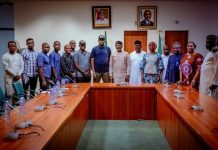The Federal Government has launched an initiative to address the brain drain in Nigeria’s healthcare sector by tapping into the expertise of Nigerian health professionals abroad. The program, titled the “Nigerian Health Professionals in Diaspora Plus Engagement Programme,” was introduced by Dr. Tunji Alausa, Minister of State for Health and Social Welfare, during the Diaspora Stakeholders’ Forum in Abuja.
Dr. Alausa explained that the goal of the initiative is to leverage the knowledge, skills, and experience of Nigerian healthcare workers overseas to enhance healthcare services in the country. The program seeks to foster long-term collaboration between diaspora professionals and their counterparts in Nigeria.
“The ongoing emigration of our healthcare workforce has created significant obstacles to achieving Universal Health Coverage. However, this program presents an opportunity to transform brain drain into brain gain,” Alausa stated. He added that the initiative aligns with the government’s four-point Strategic Health Agenda, which focuses on improving healthcare governance, systems quality, value chain development, and health security.
Alausa called for support from the private sector and international partners to ensure the sustainability of the brain drain program. He also encouraged diaspora health professionals to invest in telemedicine, biomedical technology, and clinical research to address gaps in the nation’s healthcare delivery.
Dr. Ibrahim Wada, of NISA Premier Medical Group, emphasized the role of public-private partnerships (PPPs) in boosting the healthcare system. According to Wada, PPPs have played a significant role in healthcare development over the past 15 years, particularly in treating diseases like sickle cell anemia and expanding access to quality healthcare.
Wada also stressed the importance of community engagement and capacity building at the grassroots level. He noted that effective management, alongside modern equipment, is critical to providing seamless healthcare services for both professionals and patients.
He further suggested the establishment of specialized healthcare centers across the country, each focusing on specific medical specialties. This approach, Wada argued, would help reduce the strain on institutions and decrease the need for Nigerians to seek medical treatment abroad.
Dr. Pamela Ajayi, President of the Healthcare Federation of Nigeria (HFN), highlighted Nigeria’s potential to become a regional hub for medical treatment in West Africa. Ajayi called for greater investment in medical infrastructure, including the creation of healthcare banks to fund development projects. She also pointed to the transformative potential of digital platforms and artificial intelligence (AI) to extend healthcare services to rural areas.
Ajayi emphasized that the involvement of Nigerian healthcare professionals abroad is crucial for advancing research, innovation, and infrastructure development in the sector.
Prof. Bala Audu, President of the Nigerian Medical Association (NMA), stressed the importance of international collaboration and training to retain skilled healthcare workers and improve health outcomes. Audu noted that partnerships with countries like the UK could help Nigeria strengthen its healthcare system while benefiting from shared opportunities.
Dr. Emilia Iwu, of the National Association of Nigerian Nurses in North Carolina, underscored the need for balanced investment across all levels of healthcare, particularly in primary healthcare. According to Iwu, strengthening primary health centers, which are the most accessible healthcare option for many Nigerians, would ensure timely and accurate interventions.
Iwu added that while building teaching and general hospitals is important, equal focus should be given to primary healthcare facilities to create a comprehensive system that meets the needs of all Nigerians.













